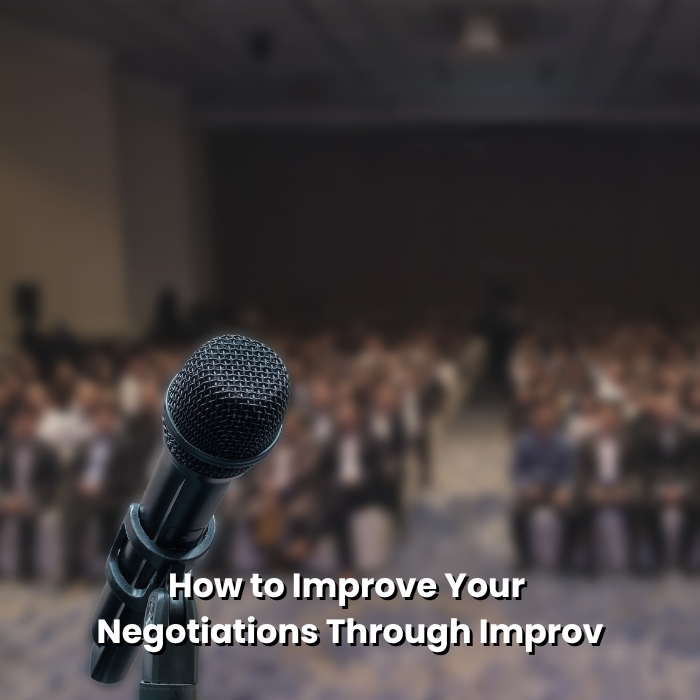
Negotiating Tips from a Former Hostage Negotiator Isaac Betancourt
Hostage negotiators need a high level of negotiating skills. I’m sure that’s no surprise. I recently interviewed Isaac Betancourt, a former hostage negotiator, and knew I had to share his insights and expert tips so you can bring them to bear in your negotiations. Isaac is an FBI trained hostage negotiator and has also trained over 800 first responders and dispatchers. He worked for the police force in Virginia for 23 years.
Having Clarity on Your Goals
The first and most important thing to consider when going into a negotiation is what your goal is. Get clarity around your desired outcome(s). Don’t make the mistake of jumping into a negotiation without taking the time and attention to get the requisite level of clarity. Consider the substantive outcomes you seek (i.e. what you want), process outcomes (i.e. the how) and relationship outcomes. It you want to achieve best outcomes, you need to know what you’re aiming for. You can’t hit a fuzzy target.
Stay on Target
Once you know what the goal is, stay focused on achieving that goal. Don’t let your emotions get in the way. We often fail in negotiations because we feel insecure and/or get triggered, emotional or frustrated. It becomes too personal, and the negotiation starts to be more about you than about the goal. When emotion takes over in a negotiation, you start trying to defend yourself and your point of view, which takes away from the end goal. You lose the clarity you need to find the path to best outcomes.
Keep the relationship in mind. It’s always critical to understand the other party’s needs in a negotiation and if part of the goal is to maintain the relationship this principle holds true even more so. If you find that you’re making the negotiation about you, stop, take a step back, refocus your attention and energy on the other party and get curious. That way you can shift the goal in a way that makes both parties happy. You just need to be clear about the outcome you want, and not lose focus on that.
Preparing for Negotiation
Many people will tell you that a big step in preparing for a negotiation is getting intelligence about the other side, but that’s not always something you can obtain. You can only prepare things that are in your control. For example, you can always control yourself, your tone and how you approach the negotiation. Be intentional about making decisions on those aspects that are within your power and control.
Decide who you want to show up as in the negotiation. As noted above, get clarity on your desired outcomes. Consider what concessions you might entertain and at what point in the negotiation. Know your BATNA (best alternative to a negotiated agreement). Consider how you can ground yourself to avoid reactivity and keep the focus on the other person. Have questions ready so you can approach the negotiation from a place of curiosity.
Wrapping
Isaac created a technique called “wrapping”, where you use values as common ground. Most experts recommend using similar interests or experiences as common ground to build rapport at the outset of a negotiation. But Betancourt notes that with that strategy you’ll likely talk about the shared interest for a few minutes and then get into the negotiation. It doesn’t actually help your negotiation or relationship. Whereas if you use your values as a common ground, you can wrap that into your negotiation.
For example, if someone is always on time, one of the traits they would be described as having is reliability. Trying to sell a product, you could wrap in the idea of that reliability and the product being reliable and use that in the negotiation.
Emotions in Negotiation
In past, emotions were not considered by experts in exploring negotiating skills or strategies. Now, the importance of emotional intelligence is a hot topic. It was previously touted that emotions had no place in negotiations. But the reality is that emotions are almost always a factor. Ignore them at your peril.
Isaac used a hostage situation as a simple example to demonstrate how emotions can impact a negotiation. If he gets on the phone with a hostage-taker and they say they don’t like cops, or his accent, and/or they’re being hostile and rude, if Isaac gets defensive and hangs up the phone, it would not be effective. That would be letting emotion take over, and not working towards the main goal to de-escalate and save the hostages. Instead, recognize the emotion at play on both sides and choose the best course. For example, a better technique would be to say “I understand you have some problems with the police, but how can we resolve this today?” Leaving ego out is key.
Negotiating with Bullies
Bullies want to be in control and seen as in charge. When dealing with bullies in negotiation, you still need to focus on the goal, but the strategy needs to be changed slightly. These types of people usually don’t trust you, and think you have a hidden agenda. Betancourt suggests that in these cases let them explain their concerns and feel in control. Use values as common ground. If you can help them trust you, it will help the negotiation.
Key Reason Negotiations Fail
A common mistake people make in negotiations is going in with a hidden agenda or not being transparent. If you tell a lie or aren’t transparent, by the end of the negotiation it will surface. Authenticity is a better strategy. Trust is a cornerstone of effective negotiations. It’s hard to earn but easy to lose. Be intentional about how to build trust rather than trying to put one over on the other side.
Key Skill of Effective Negotiators
Self-awareness is key in negotiations. Be your authentic self rather than putting on a persona. Betancourt noted that many people associate being themselves as a weakness, and that is far from true. Putting on a persona takes energy whereas being your authentic self makes you more relaxed and goal focused. If you’re trying to put on a persona, you’re focusing more on that than about the goal.
These tips have been used by Isaac Betancourt as a hostage negotiator, and taught to over 800 first responders and dispatchers, including officers from the Pentagon, CIA, and FBI. Keeping these tips in mind is sure to help you in future negotiations. For a deeper dive, check out the full interview with Isaac Betancourt.
- Negotiating Tips from a Former Hostage Negotiator Isaac Betancourt - January 16, 2025
- How to Improve Your Negotiations Through Improv - January 15, 2025
- Hot Tips on How to Negotiate Balance in Your Life Part IV - January 14, 2025






